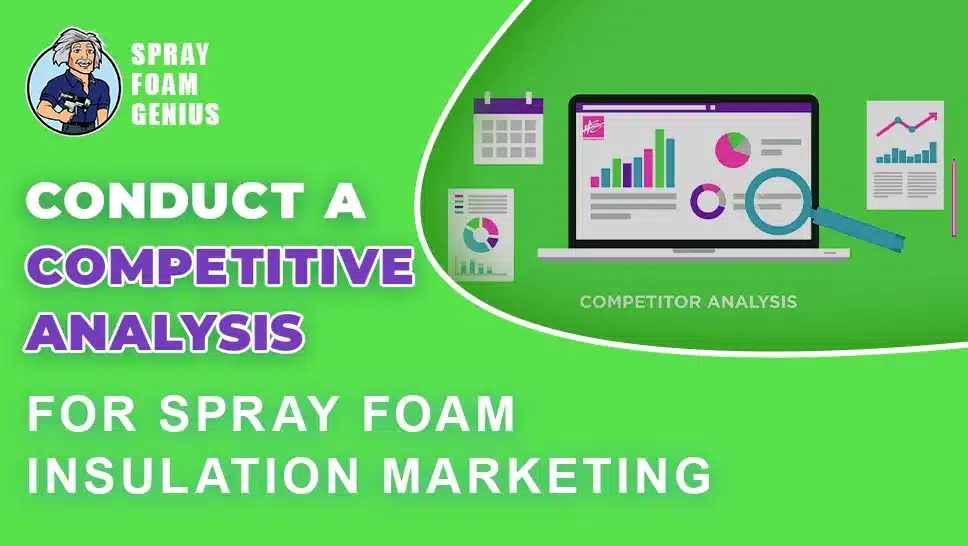
In the competitive world of spray foam insulation, having a strong online presence is essential. Most homeowners will only reach out to one or two companies they find first and feel they can trust. Knowing how your competitors attract those leads gives you an opportunity to improve your own visibility and marketing efforts.
By analyzing your competitors carefully, you can learn what similar businesses are doing well—or poorly—on search engines, social media, and their websites. This understanding helps you shape a more effective and targeted strategy for your own company.
Why Competitive Analysis Matters
Spray foam insulation is a local service. Customers often search for providers in their area using terms like “spray foam insulation near me” or “[City] insulation contractor.” If your business doesn’t appear in those search results, you’re likely being overlooked.
A well-conducted competitive analysis will help you understand:
- Which companies appear most frequently in search results
- What keywords they use to attract traffic
- How they build trust through reviews, website content, and ads
- What platforms and messaging strategies they rely on
Identifying Your Actual Local Competitors
Big brands may have a presence in your area, but your most relevant competition is usually made up of businesses consistently appearing in local search results. These are the companies that rank well for terms like:
- “spray foam insulation [your city]”
- “attic insulation contractor [your city]”
Use a private browser window to search those terms and list the businesses that appear frequently. These are the ones you should focus on.
Reviewing Google Business Profiles
Your competitors’ Google Business listings can offer valuable insight into how they attract and convert leads. Pay attention to the following elements:
- Categories they’ve chosen for their listing (e.g., Insulation Contractor, Spray Foam Insulation)
- Number of customer reviews and their average rating
- How recently their reviews were posted
- Whether or not the business owner responds to customer feedback
These indicators can help you understand their strengths and areas where you might be able to outperform them.
Studying Their Website and Content Strategy
A company’s website serves as its digital storefront. When evaluating your competitors’ websites, look for:
- Keywords they appear to be targeting (e.g., “garage insulation,” “attic foam”)
- Use of blog content or city-specific service pages
- Types of calls to action (e.g., quote forms, phone numbers, free consultations)
- Overall quality, structure, and clarity of the website content
You can use SEO tools to get a clearer view of the keywords they rank for and how well their pages are performing.
Assessing Customer Reviews and Reputation
Customer reviews offer insight into both the business’s reputation and customer expectations. Consider:
- How many reviews each competitor has
- Their average star rating
- The recency of the most recent reviews
- Whether the business engages with customer feedback
- Common themes in positive or negative comments
This information will give you a sense of how customers experience each business—and what they value most.
Observing Their Advertising and Social Media Activity
Advertising and social media can be strong indicators of how aggressively a competitor markets their services. Look at:
- Whether they’re running Google Ads or paid social campaigns
- What kind of offers or messaging they promote (discounts, free estimates, etc.)
- How active they are on platforms like Facebook and Instagram
- The quality of engagement (comments, shares, likes) on their posts
- The use of project images, customer stories, or before/after photos
Even modest but consistent activity can build local trust and visibility over time.
Useful Tools for Research
To assist in your research, consider using these tools:
- Google Search and Maps – For identifying top local competitors
- SpyFu – To view their keyword rankings and ad history
- Ubersuggest – For keyword research and SEO analysis
- BrightLocal – For local SEO audits and citation monitoring
- Keywords Everywhere – A browser extension that reveals keyword trends on websites
Turning Insights into Strategy
Once your research is complete, turn your findings into actionable improvements:
- Update your Google Business categories to align with top competitors
- Create content that targets similar or missing keywords
- Improve your review collection process and response practices
- Identify where competitors are not advertising—and test your ads there
- Keep your social media profiles active with relevant, visual content
Conclusion
Success in the spray foam insulation industry relies on being visible and trustworthy in your local market. Competitive analysis helps you identify what works for others and where you can stand out. By tracking your competitors regularly and applying those insights, you’ll be better positioned to improve your digital presence and grow your business effectively.
For assistance with competitive analysis or to enhance your spray foam marketing strategy, you can contact Spray Foam Genius Marketing:
📞 USA: 877‑840‑FOAM
📞 Canada: 844‑741‑FOAM
🌐 https://sprayfoamgeniusmarketing.com
- Social Media Marketing for Spray Foam Businesses: What Works in 2025? - February 6, 2025
- Best SEO Strategies for Spray Foam Insulation Contractors to Rank #1 on Google - February 6, 2025
- What is Spray Foam Insulation? Benefits and Applications - February 5, 2025

